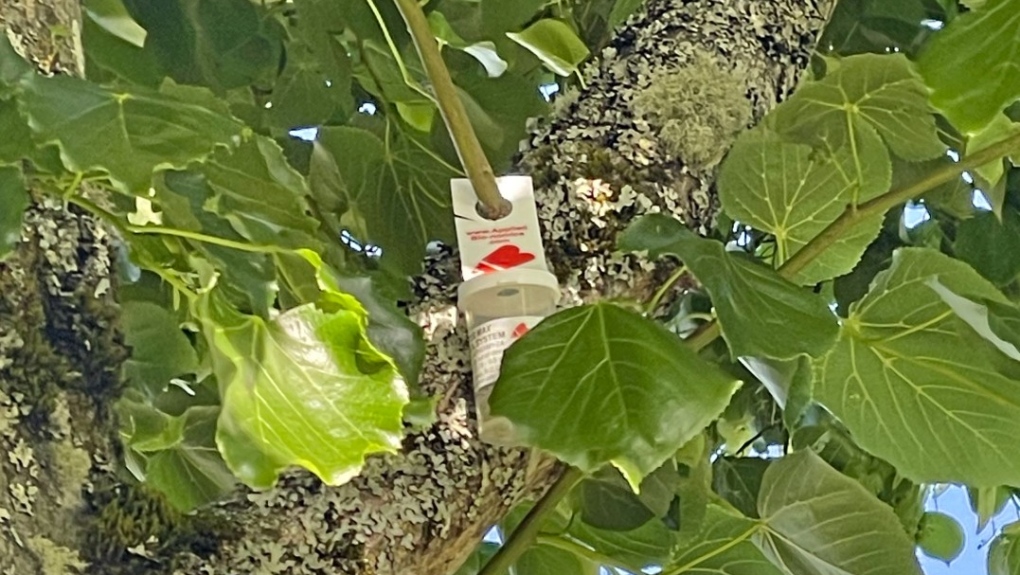Colwood releases thousands of ladybugs to protect trees and parks
 A ladybug clings to the edge of a Stone Crop Sedum leaf on Tuesday morning June 25, 2013, in Salina, Kan. (AP Photo / Salina Journal, Tom Dorsey)
A ladybug clings to the edge of a Stone Crop Sedum leaf on Tuesday morning June 25, 2013, in Salina, Kan. (AP Photo / Salina Journal, Tom Dorsey)
The City of Colwood has released thousands of aphid-eating ladybugs to help protect its trees, parks and shrubs.
Last week, the city said its parks team released the colourful insects around Colwood "as a way to manage the damage caused by pests such as aphids."
A single ladybug can eat as many as 5,000 aphids in their lifetime, according to the city.
"Ladybugs are an inexpensive and environmentally friendly alternative to harmful chemical pesticides," said the municipality in a release Tuesday.
Ladybugs can live up to two to three years, and hibernate in the winter when it's cold, staying alive by feeding on their own fat reserves.
The insects tend to sleep in the early morning when it's cool before becoming active in the sunshine.
Besides ladybugs, Colwood is also releasing aphid midges across the city, which eat aphids.
"The midges are more likely to stay put in windy locations, and are almost as voracious as the ladybugs, consuming 60 different species of aphids," said the municipality.
"Small pill-bottle sized containers of the wee beneficial midges are hung in the trees so they can make their way onto the leaves."
 A ladybug larve container is pictured in Colwood. Similar containers full of aphid midges are also hung in the city. (City of Colwood)
A ladybug larve container is pictured in Colwood. Similar containers full of aphid midges are also hung in the city. (City of Colwood)
CTVNews.ca Top Stories

B.C. tenants evicted for landlord's use after refusing large rent increase to take over neighbouring suite
Ashley Dickey and her mother rented part of the same Coquitlam duplex in three different decades under three different landlords.
Mountain guide dies after falling into a crevasse in Banff National Park
A man who fell into a crevasse while leading a backcountry ski group deep in the Canadian Rockies has died.
Expert warns of food consumption habits amid rising prices
A new survey by Dalhousie University's Agri-Food Analytics Lab asked Canadians about their food consumption habits amid rising prices.
MPP Sarah Jama asked to leave Ontario legislature for wearing keffiyeh
MPP Sarah Jama was asked to leave the Legislative Assembly of Ontario by House Speaker Ted Arnott on Thursday for wearing a keffiyeh, a garment which has been banned at Queen’s Park.
Charlie Woods, son of Tiger, shoots 81 in U.S. Open qualifier
Charlie Woods failed to advance in a U.S. Open local qualifying event Thursday, shooting a 9-over 81 at Legacy Golf & Tennis Club.
Ex-tabloid publisher testifies he scooped up possibly damaging tales to shield his old friend Trump
As Donald Trump was running for president in 2016, his old friend at the National Enquirer was scooping up potentially damaging stories about the candidate and paying out tens of thousands of dollars to keep them from the public eye.
Here's why provinces aren't following Saskatchewan's lead on the carbon tax home heating fight
After Prime Minister Justin Trudeau said the federal government would still send Canada Carbon Rebate cheques to Saskatchewan residents, despite Saskatchewan Premier Scott Moe's decision to stop collecting the carbon tax on natural gas or home heating, questions were raised about whether other provinces would follow suit. CTV News reached out across the country and here's what we found out.
Montreal actress calls Weinstein ruling 'discouraging' but not surprising
A Montreal actress, who has previously detailed incidents she had with disgraced Hollywood producer Harvey Weinstein, says a New York Court of Appeals decision overturning his 2020 rape conviction is 'discouraging' but not surprising.
Caleb Williams, Jayden Daniels and Drake Maye make it four NFL drafts with quarterbacks going 1-3
Caleb Williams is heading to the Windy City, aiming to become the franchise quarterback Chicago has sought for decades.































